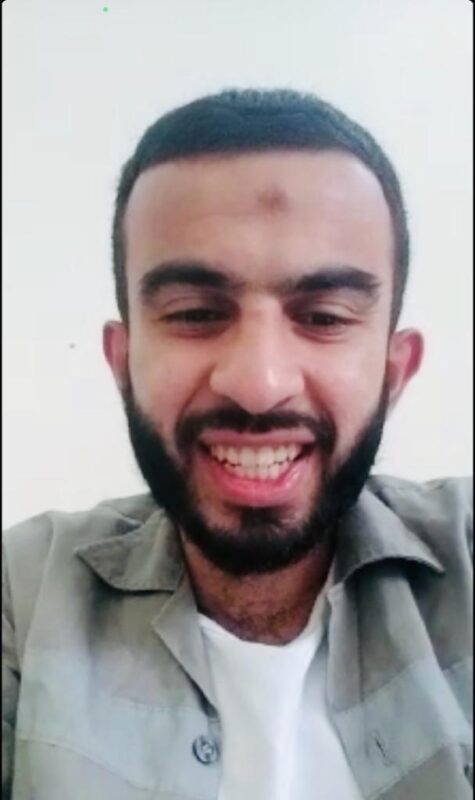Husain Ali Maki Ali, a 16-year-old Bahraini high school student and minor, was arrested by Bahraini authorities while he was practicing sports on 12 January 2015, without presenting an arrest warrant. During his detention, he was subjected to torture, forced disappearance, denial of access to legal counsel during interrogation, an unfair trial, solitary confinement, and the deprivation of communication with his family, as well as visits from them. He is currently serving a life sentence on politically motivated charges in Jau Prison.
On 12 January 2015, while Husain was exercising on the outskirts of AlQurayyah village in the Sitra Governorate, a police car intercepted him. Police officers chased him and fired rubber bullets at his leg, injuring him. Then, they arrested him and transferred him to the Isa Town Police Station, where he forcibly disappeared for ten days. Upon learning of the arrest incident from local residents, Husain’s parents went to the Isa Town Police Station, where officers lied to them, denying his presence in their custody.
Husain had previously been arrested on 14 February 2013 while he was participating in a peaceful gathering of the residents of Sitra on the occasion of the second anniversary of the Pro-Democracy Movement in Bahrain. However, he was later released.
During Husain’s interrogation at the Isa Town Police Station, officers subjected him to physical beatings with hands, batons, sharp objects, and punches to the face. He was also denied his right to attorney access. Due to injuries sustained from torture and the leg injury caused by a rubber bullet during the arrest, Husain was transferred to the Military Hospital on 13 January 2015. He remained there for three days without his family’s knowledge, as he was forcibly disappeared. Despite the family’s inquiries about his whereabouts and condition at various stations, the Ministry of Interior (MOI) remained completely silent about his situation. After his discharge from the hospital, Husain was sent back to the Isa Town Police Station. On 21 January 2015, he was brought before the Public Prosecutor Office (PPO) and subsequently transferred to the Dry Dock Detention Center. His family was finally able to visit him the next day and saw the swelling in his eye and signs of beating on his face. Husain then informed them about the torture he endured at the Isa Town Police Station, therefore, the family realized that the officers at the Isa Town Police Station had lied to them.
Husain was not brought before a judge within 48 hours of his arrest, and he was not given adequate time and facilities to prepare for his trial. Furthermore, he was unable to present evidence and challenge the evidence presented against him. The charges brought against him during the interrogation were used as evidence, despite his refusal to confess to them, and his preference to endure torture rather than admit to the fabricated charges. In January 2016, the court sentenced him to one year in prison on charges of illegal assembly. Later, he received an additional one-month imprisonment for another protest-related case. On 7 September 2016, the court sentenced Husain to life imprisonment on charges of funding and possessing weapons, which were fabricated against him during his initial one-year imprisonment sentence. The verdict was subsequently upheld by the appeals and cassation courts.
On 10 March 2015, protests erupted among prisoners at Jau Prison. Subsequently, riot police deployed tear gas and bullets in nearby areas to subdue the inmates, including those who were not participating in the protest. Afterwards, they were led to outdoor yards where they faced collective beatings and humiliation. Husain was one of those prisoners who endured beatings and humiliation during this incident.
Husain has repeatedly endured solitary confinement and has been deprived of communication with his family. The family has filed several complaints with the Ombudsman and the National Institution for Human Rights (NIHR) regarding his arbitrary arrest, fabricated charges against him, communication cutoffs, and recurrent solitary confinement. However, the family has not noticed any changes. Since 2018, Husain has refused to receive visits in protest against the visits being conducted behind a glass barrier and against the restrictions that his family faces during the visit. These restrictions include waiting for long hours outside the prison building under the scorching sun, facing humiliating searches, including at times inspection of their underwear, and abruptly canceling the visitation schedules sometimes despite the family’s arrival.
Husain’s arrest due to his participation in protests without an arrest warrant, torture, forced disappearance, denial of access to legal counsel during interrogation, unfair trial, solitary confinement, and deprivation of communication with his family and visits from them constitute violations of the Convention Against Torture and Other Cruel, Inhuman or Degrading Treatment or Punishment (CAT), the International Covenant on Civil and Political Rights (ICCPR), and the International Covenant on Economic, Social and Cultural Rights (ICESCR), to which Bahrain is a party. Furthermore, the violations he endured as a minor contravene the Convention on the Rights of the Child (CRC), to which Bahrain is also a party.
Accordingly, Americans for Democracy & Human Rights in Bahrain (ADHRB) calls on the Bahraini authorities for the immediate and unconditional release of Husain. ADHRB also urges the Bahraini government to investigate allegations of arbitrary arrest, forced disappearance, denial of attorney access during interrogation when he was a minor, solitary confinement, and deprivation of communication with his family and visits from them, holding the perpetrators accountable. At the very least, ADHRB advocates for a fair retrial for him under the Restorative Justice Law for Children, leading to his release. Additionally, it calls on the Jau Prison administration to cease the policy of humiliating prisoners’ families, including forcing them to wait for long hours outside the prison building under the sun, subjecting them to demeaning inspections, and abruptly canceling visitation schedules after their arrival. This would allow them to meet their children without harassment, thus ending the reasons that led some prisoners, including Husain, to refuse visits.





